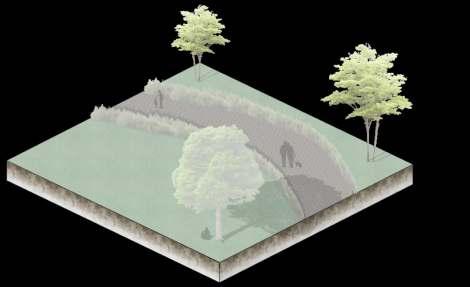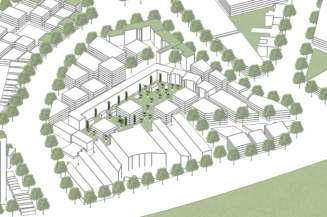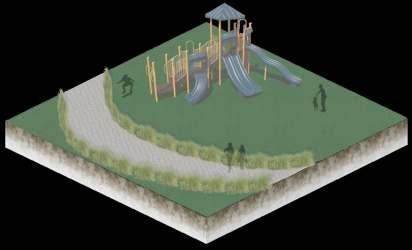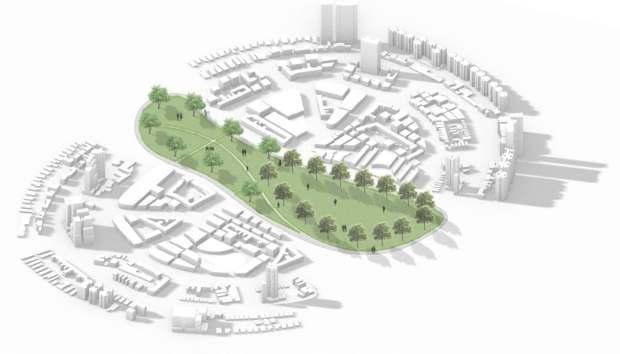
3 minute read
Mixed-used / Business development
It offers a useful area for leisure time activities, fostering physical health, wellbeing, and menta relaxation. The lush park provides a tranquil setting for leisure, picnics, and social meetings, acting as a natural oasis within the metropolitan setting. The park and communal garden improve the city's visual attractiveness and foster a friendly attitude, which adds to its overall aesthetic appeal Additionally, they offer crucial ecosystem services including carbon sequestration, air purification, and the development of habitat for urban animals.
SMART GIRD
Advertisement
A smart grid’s implementation in a city has several advantages, including effective electricitymanagement,increaseddependability,andfewerpoweroutages.Itmakes itpossibletoincluderenewableenergysources,creatingacleaner,moresustainable energy mix while reducing the effects of climate change. Demand response programmes, which offer real-time energy data and encourage energy saving, are another way that smart grids give users more power. Furthermore, they promote effectiveloadmanagementandcharginginfrastructure,whichsupportstheexpansion of electric cars. In general, smart grids improve urban sustainability, customer involvement, renewable energy integration, energy efficiency, and system stability.
URBAN FARMING
Local food production, increased food security, environmental sustainability, community involvement, a better urban microclimate, and economic prospects are just a few of the advantages of urban farming. It offers a workable option for encouraging resilient and sustainable food systems in urban settings.
GREEN INFRASTRUCTURE


Urban Tree Cantopy
First off, trees reduce ambient temperatures and improve human comfortbyofferingshadeandevaporativecooling,mitigatingthe urbanheatislandeffect.Byremovingpollutantsfromtheairand releasingoxygen,theyhelpenhanceairquality,creatingsaferand morehygieniccities.Urbantreesalsoserveasorganicstormwater management systems, capturing and absorbing precipitation, lowering runoff, and easing pressure on drainage systems.

Green Wall For Commerical Buildings
By filtering pollutants and particulates, green walls enhance air quality, making cities healthier and more aesthetically pleasing forbothresidentsandtourists.Additionally,theyserveasnatural insulation, which lowers energy consumption by adding to thermal insulation and assisting in temperature control indoors.
Theseeffectscanresultinconsiderableenergysavingsandreduced
SMART MOBILITY
INTELLIGENT STREET LIGHTING
Car
Intelligent street lighting provides energy efficiency, cost savings, increased safety, environmental sustainability, smart city integration, and data-driven insights, making it an attractive option for modern urban lighting systems.
AIR QUALITY MONITORING
Mixed-use complexes improve overall quality of life by mixing residential, commercial, recreational, and institutional uses in close proximity and reducing the need for long commutes. Within a 15-minute walk or bike ride, residents may easily reach amenities including offices, parks, grocery stores, schools, and healthcare centres, easing traffic congestion and lowering carbon emissions. As individuals from all backgrounds and age groups use common areas and participate in activities together, mixed-use complexes also promote a feeling of community and social interaction. The wellbeing and convenience of locals are given priority in this urban development concept, which promotes sustainable practises, enhances accessibility, and develops lively inclusive neighbourhoods.
TRANSPORTATION PLANNING
HIGH-SPEED BROADBAND NETWORK

Community Garden
Access to locally grown, wholesome, and fresh vegetables is made possible through community gardens, which also promote food security and enhance inhabitants’ general health and wellbeing. Community gardens encourage a sense of belonging and social cohesiveness by bringing individuals from all backgrounds together to work together, exchange information, and form connections. These gardens can improve urban greening, enhancing neighbourhood aesthetics, reducing the impact of urban heat islands, and promoting cleaner air.
INTELLIGENT WATER SYSTEM
Source Water Motor Water PipeWater TankSmart City
Cities may gain a lot from implementing intelligent water systems, including effective water management and conservation, real-time monitoring, and proactive water loss reduction strategies. These technologies improve monitoring and control of water quality while also ensuring equal access to clean water.
They support environmental sustainability and the conservation of water resources by encouraging sustainable water practises. The resilience, dependability, and sustainability of urban water infrastructure are all improved by intelligent water systems, making cities more habitable and ecologically friendly.
Theflowofproductsandservices is made easier by improving accessibility for companies and customers via the optimisation of transportation infrastructure andconnectivity.Theconnection betweencommercialdistrictsand residential neighbourhoods is improved through well-designed transport networks, including highways, public transit systems, andinfrastructureforpedestrians and cyclists. This facilitates effectivecommutingandexpands theconsumerbaseforcompanies.
Businesses may access online marketplaces, increase their consumer base, and take part in e-commerce operations thanks to this infrastructure. It makes it easier for people to communicate and work together effectively both inside the company and with clients or partners all around the world. Businesses may take use of modern technologies like cloud computing and data analytics with a highspeed broadband network to streamline operations, increase efficiency, and make wise choices.
TOURISM AND DESTINATION MARKETING
Businesses may gain from more visitors by successfully marketing a city as a popular tourist destination, opening up new avenues for expansion and income production. By highlighting the city's distinctive features, cultural offers, and experiences, effective marketing campaigns may draw tourists to the area and encourage them to check out the local businesses. The demand for lodging, dining, transportation, and other hospitality-related enterprises may all be increased through destination marketing initiatives that draw business travellers, conferences, and events. Tourism and destination marketinginitiativesmaypromoteafavourableimageforthecity,improvebrandrecognition,andboost economic activity, supporting business growth and success for the community and its entrepreneurs.



